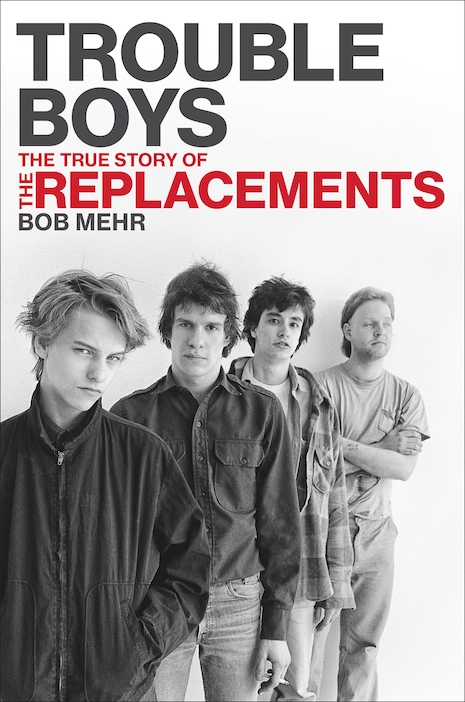
Trouble Boys: The True Story of the Replacements
, the highly anticipated biography of the legendary Minneapolis group, is out this week. Author Bob Mehr has done nothing less than pen the definitive ‘Mats bio, and Dangerous Minds has an exclusive excerpt.The Replacements had a reputation for rowdy, drunken performances, and our excerpt from Trouble Boys details a show in Houston that just might be their wildest gig ever. It takes place in the fall of 1985, during the early stages of the Tim tour. Bassist Tommy Stinson had recently been arrested for public intoxication prior to a show in Norman, Oklahoma, spending the night in jail.
The rising action of the tour reached its climax a few nights later in Houston, where the ’Mats played the Lawndale Art Annex.
It was an unusual venue for the band—a couple of miles from the University of Houston campus, it was basically an old warehouse the school used for more highbrow art events. The gig’s promoter, Tom Bunch, had been booking hardcore and punk shows in the city for several years, working with Black Flag and the Dead Kennedys (he would go on to manage the Butthole Surfers) without any problems.
The Replacements had sold some 600 tickets in advance to a mix of punk scenesters and college kids. The latter demographic was making up a more noticeable chunk of the band’s audience. “Hey, Greeks! If you like Springsteen, R.E.M. or U2, you’ll love the Replacements!” ran a show ad in one student newspaper that autumn.
There was also an increasingly large contingent of rubberneckers. “The audience no longer exclusively consisted of people who ‘got it,’” said Replacements’ soundman Monty Lee Wilkes. “I could see it looking around every night. There were the people that had come solely to see the car crash. You’d overhear them in the can: ‘I hope they’re not too drunk tonight.’ ‘Oh man, that’s the only way to see them.’ These were the kind of people who would’ve tried to beat up the band at a party two years earlier.”
The Lawndale Annex gig also reunited the Replacements with Alex Chilton, who’d come up from New Orleans to play a couple of shows with the band. Perhaps Chilton’s presence played a part—singer/guitarist Paul Westerberg was always looking to impress him—but that night Paul almost singlehandedly started a riot. “For years I claimed Alex had spiked my drink backstage and put some sort of hallucinogen in it,” said Westerberg, “because my behavior was so off the map.”
From the start, manager Peter Jesperson sensed it was going to be one of those shows. Early on the Tim tour, he’d tried harder to dole out the booze in increments, and not too far in advance. “I’d have to lie to them all the time about that: ‘We can only get a twelve-pack now.’ I was trying to ration it out as best I could.”
In Houston, Chilton asked Jesperson for a lift back to his hotel and to wait while he got ready, then took his time shaving and getting dressed. Meanwhile, the band got its hands on the rest of the liquor: “A bottle of whiskey, a bottle of vodka, two cases of Bud, one of Heineken, and one bottle of red wine,” recalled Bunch. When he went in to check on them a little later, “every bottle was empty. Completely bone dry. I thought, This is going to be interesting.” When Jesperson finally returned, he walked into the dressing room to find the band had “actually embedded bottles of Heineken into the drywall. Not only was the liquor gone, but I was required to get them more.”
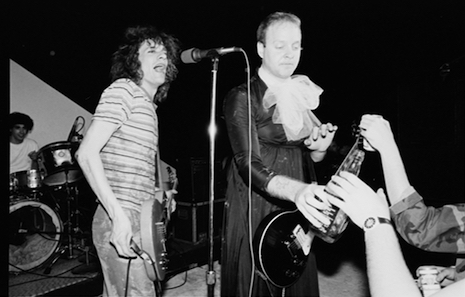
Photos from the Houston gig courtesy Mark Lacy.
Outside, fans did double takes: Paul and Tommy Stinson and a couple of local women “were sitting out front of the venue, in the gravel parking lot, in a kiddie pool, with no water in it, completely fucking drunk,” said Bunch. Meanwhile, Chilton’s set was being marred by some hecklers. “So Paul and Tommy dragged the kiddie pool out into the middle of the people who were being assholes, just to mess with them,” recalled Wilkes.
The Replacements began. As a local alt-weekly reported: “To say ‘degenerate’ implies that the Replacements started out in control.” Drinking Jack Daniels from the bottle, Paul stumbled back into the amps, and then fell into Chris Mars’s drum kit. “I was legless when we went on and couldn’t play at all,” said Westerberg. “We finally tried ‘Johnny B. Goode,’ thinking that might come easy, but I couldn’t finish a song.”
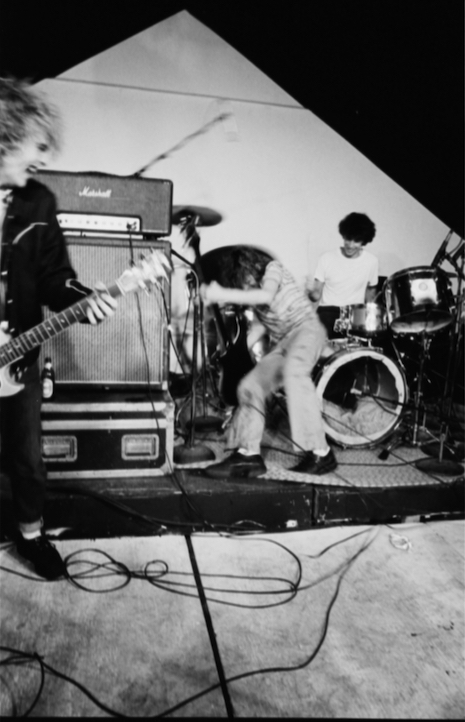
After about thirty minutes of this ineptitude, Westerberg knew what had to be done: “It became plain that we could suck or we could incite a riot and get this thing over with,” he said. The audience’s ire was already obvious, as they booed and shouted at Westerberg. “People were fucking pissed off that they’d paid eight bucks to see this,” said Bunch. “Then they started throwing stuff at him.” The band promptly picked up the half-full beer cans aimed their way and drank the remains.
Westerberg got on the mic and offered the audience their money back. He grabbed his wallet, fished out a few dollar bills and threw them into the crowd. At that point, a line of disgruntled patrons formed at the box office looking for their refunds—“whereupon the doorman spirited the cash box to safety,” as the Houston Chronicle noted.
Once things began to devolve, much of the crowd—which included the Velvet Underground’s Sterling Morrison, whom Bunch had invited to the show—fled in fear. “Half the audience bolted when it got weird, ’cause they thought it was going to get violent,” said Bunch. “The other half stayed to the bitter end to see the debacle.”
The older couple who ran the Annex quickly called campus police. It took them only a few minutes to arrive, and they were followed closely by a group of City of Houston police officers. By then, however, things had gotten even uglier:
“You suuuuck!”
“Go back to Minneapolis, you Yankee pieces of shit!”
At that, Westerberg went into his wrestling heel routine, laying it on thick.
“You guys are a buncha fucking ignorant rednecks. If you come up north to Minneapolis, this is what we call music,” he said mockingly. “This is actually considered quality music north of the Mason-Dixon Line. You fuckers wouldn’t know good music if it hit you in the head.”
“That really, really pissed the audience off,” said Bunch. “Calling Texans a bunch of ignorant hicks? Those were fighting words.”
Sure enough, a group of shit-kickers down front lunged at Westerberg’s legs, trying to pull him down. “I remember getting a cowboy boot right up the spine, right up the ass,” said Westerberg. “A guy literally kicked my ass back up on the stage.”
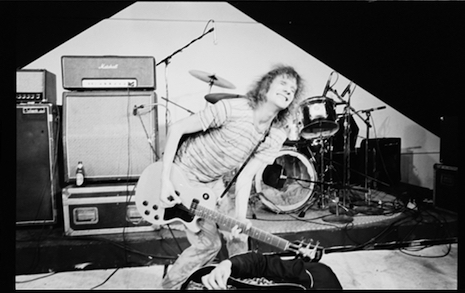
When the cops showed up, they immediately ordered Wilkes to shut off the PA. “But they were the kind of band that was so loud you could turn the PA off and not notice any difference,” Wilkes said.
Attempting to bring it to a close, the police were forced to go onstage and physically take the instruments from the band. Jesperson watched as one of Houston’s finest snatched Westerberg’s guitar from around his neck. “I’d seen a lot of stuff with the Replacements, but I’d never seen that happen,” he said.
Westerberg continued jawing and tussling with the crowd. It appeared he was about to be pulled into a sea of angry Texans when the police intervened. “Five cops tried to keep thirty or forty people from beating up the band,” said Bunch. “The cops were throwing people off the stage, throwing them by their arms and hair and trying to keep them from pummeling those guys.”
The ’Mats made a hasty exit stage left; Westerberg figured they’d arrest him for inciting the whole mess. “I do remember,” he said, “someone shoving me under the table in the dressing room behind a tablecloth, hiding me from the police.”
The band managed to escape without being locked up. Bunch, meanwhile, was billed several thousand dollars for the police services and the venue damages to the Annex. “They never did another musical event there,” he said.
After the show, Westerberg, still seriously wasted, realized he needed to call his girlfriend Lori Bizer back home to check in. Jesperson stopped at a pay phone and marveled as Paul chatted casually with Bizer.
“I was close enough to overhear, and he was talking totally normal. ‘Hi, honey, how you doing?’ He was acting as if nothing had happened.”
“Paul’s thing was performance art,” said Agitpop’s John DeVries. “I was never once under the impression that it was some dumb guy who was drunk, stumbling through all this. He knew exactly what was up, always.”
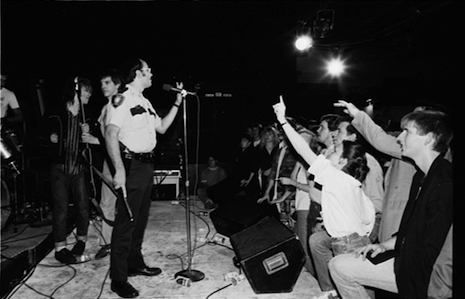
From Trouble Boys: The True Story of the Replacements by Bob Mehr. Reprinted courtesy of Da Capo Press.
I asked the author a few questions via e-mail:
How long did it take to write the book? What sort of roadblocks did you encounter, if any? If there were delays, it seems to have worked in your favor, what with their recent reunion.:
Bob Mehr: Well, my first thoughts about the book stretch back more than a decade to 2004—the point at which I first met Paul and Tommy in person (having interviewed both over the years by phone). I began talking and pitching the idea of the project seriously in 2007 (around that time I was also involved in the Rhino Replacements reissue campaign some; writing liners for Tim and assisting on some bonus track legwork on All Shook Down). Paul and Tommy basically agreed in 2008 to participate after I did a big SPIN magazine feature story on the Replacements—but I had to wait for some business to clear up with the band before I could sell the book, which I did in 2009. Started work on it that May and got the final proofs of the book back in December 2015. So in total: six and half years of actual hardcore research and writing, a couple more than that trying to make it happen with the band, and ten years plus from the first thought that this book could be a possibility.
No roadblocks as such. Paul and Tommy let me get on with my business without interference. I talked to who I wanted all across the board—from family and friends, to producers, managers and record company personnel. The difficulty, I suppose, mostly lay in establishing a serious level of trust with the key players for them to be as honest and revealing as possible. For an outsider to come in and tell this story, and tell it as deeply and penetratingly as I hoped, was probably the biggest challenge. It was a leap of faith on their part to entrust me with writing the band’s history. That happened incrementally, I think. But in the end I feel like I got the goods because they were ready and willing to tell their story.
Their reunion was helpful in a lot of ways. Admittedly, it did delay the book’s release somewhat—naturally, I wanted to see what was going to happen and incorporate as much of that into the book, or at least the book’s epilogue, as possible. But it also gave me a great (mostly happy) ending to the story, which I didn’t really have before.
A while back, while you were in the midst of conducting interviews for Trouble Boys, I read an interview you gave in which you said something to the effect, “I get the impression that Paul and Tommy are talking to each other through me.” I thought that was interesting—could you elaborate?:
Bob Mehr: I guess I meant this mostly from the earlier period I was working on the book, prior to their reunion. I think as close as Paul and Tommy are, their relationship tends to come and go in waves, at least in terms of communicating directly. And I think, naturally, that during this process, each of them was curious what the other was telling me—both for the book, and in general. Plus, during the first few years of researching and conducting interviews, the idea of their reunion was always lurking in background, so there was some sense of them talking about that through me, when they weren’t always speaking directly. And then there were times where I was asking about the band, and getting them reminiscing about things from years ago—that also spurred them to communicate with each other, just being reminded of things from the old days. I will say they have this incredibly powerful and strange bond that’s hard to describe—it’s a very deep and very complicated mix of brotherhood, creative chemistry, business partnership, and on and on. So to be in middle of that at times was a deeply fascinating experience.
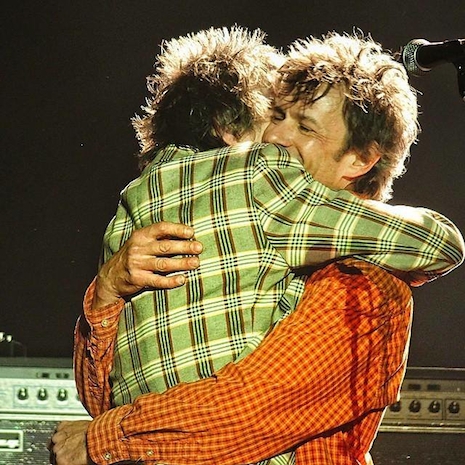
Stinson and Westerberg embrace onstage in 2014.
Trouble Boys: The True Story of the Replacements is available on Amazon.
The band played live on TV just a few times, and this 1986 showing on the British music program Whistle Test (a/k/a The Old Grey Whistle Test)—performing “Kiss Me on the Bus” from Tim—would prove to be the final television appearance by the original lineup:
Previously on Dangerous Minds:
The Replacements censored on live awards show (but get the last laugh), 1989
Tommy Ramone on The Replacements
Did you know The Replacements liked to drink?